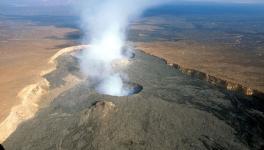Air Pollution Responsible for More Deaths Worldwide Annually than COVID-19 to Date: Study

Representational use only.Image Courtesy: Flickr
Patna: Amid heat wave-like conditions in parts of India, rising air pollution poses a severe risk to human health, especially for vulnerable populations in Bangladesh, Myanmar, Nepal, and parts of India. This was revealed in the latest study by a team of experts.
The vulnerable population facing the brunt of hazardous levels of Particulate Matter (PM) is primarily the marginalised sections and the working class in the four countries.
According to a research study by Kathmandu-based International Centre for Integrated Mountain Development (ICIMOD), air pollution poses severe threats to human health – contributing to neonatal morbidity, stunting and learning delays in children. Prolonged exposure is linked to respiratory illnesses, heart diseases, and other health complications, especially for vulnerable populations.
"Worldwide, air pollution is responsible for more deaths annually than COVID-19 to date,” said Dr Bhupesh Adhikary, Senior Air Quality Specialist ICIMOD.
Adhikary further said, “Despite this catastrophic death toll, we aren’t tackling this invisible killer with anything like the same energy. It’s time we try to improve air quality on a war footing. The good news is that we know what is causing air pollution in our region and how to make rapid progress in reducing our exposure to pollutants. We urge governments, donors and NGOs to work with us to build a coalition to drive action on clean air."
As per the ICIMOD study, the spike in air pollution in the region is due to increased forest fires, which are increasing in number and severity due to climate change, and residential biomass burning. As well as the impacts on human health, pollutants cause extensive damage to the region’s rich biodiversity and accelerate climate impacts.
The study pointed out that rising temperatures are causing glaciers in the region to melt at an alarming rate: if global warming exceeds 2°C, it will result in losing 50% of the glaciers in the region, leading to changes in river flows which can have severe consequences for freshwater biodiversity, agriculture, drinking water, and other human needs.
"Black carbon or soot emitted from forest fires and burning crop residues after harvest can accelerate the melting of high mountain glaciers, further contributing to their decline," the study said.
ICIMOD sincerely expressed concern about the deteriorating air quality. For instance, in the case of Kathmandu, Nepal's capital, PM 2.5 levels exceeded 205 µg/m3 on April 11, 2023, with PM10 levels reaching a staggering 430 µg/m3 on April 13, 2023. These alarming data points highlight the urgent need for action to address this critical issue.
ICIMOD works with different partners in the HKH region to generate ground-based observation data and satellite/model-based data on air quality. These shreds of evidence are critical for policy formulation and implementation.
Get the latest reports & analysis with people's perspective on Protests, movements & deep analytical videos, discussions of the current affairs in your Telegram app. Subscribe to NewsClick's Telegram channel & get Real-Time updates on stories, as they get published on our website.
























